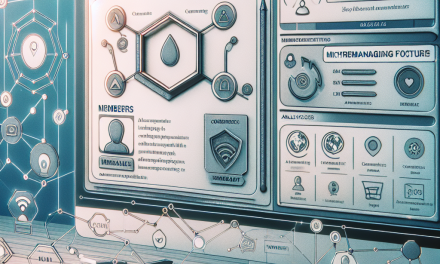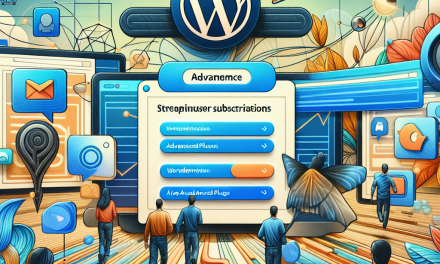In today’s digital landscape, collaboration among multiple authors can be both a blessing and a challenge, especially for tech blogs like WafaTech. When you have a diverse group of contributors, the sharing of ideas can lead to rich, engaging content. However, without proper management strategies, the potential for chaos increases. In this article, we’ll explore effective strategies for managing multiple authors to enhance content quality and streamline the collaborative process.
1. Establish Clear Guidelines
Having a well-defined set of guidelines is critical for any collaborative effort. This should include:
- Content Tone and Style: Outline the preferred voice and writing style to maintain consistency across posts.
- Formatting Rules: Specify how headings, bullet points, and images should be handled.
- SEO Practices: Provide guidelines on keyword usage, meta descriptions, and alt text for images to ensure that all posts are optimization-ready.
You can create a centralized document (like a Google Doc or a shared Dropbox file) accessible to all authors to keep everyone aligned.
2. Use Editorial Calendars
An editorial calendar is a vital tool for managing multiple authors in a blog setting. It helps you schedule when each post will be published and allows authors to see what topics are being covered. This prevents overlap and keeps the content fresh. There are several plugins available that can help you manage your editorial calendar easily, including:
-
Edit Flow: This powerful plugin allows you to manage your team’s workflow and communicate editorial statuses.
- Editorial Calendar: A plugin that gives you a visual overview of your upcoming posts.
You can learn more about these tools in the WordPress Plugin Directory.
3. Utilize Revision History
WordPress has an inbuilt feature that allows you to review the revision history of posts. This is double-edged; while it allows for easy collaboration, it is crucial to have a designated author (or editor) approve the final version before publishing.
Familiarize yourself with how to revert to previous versions of a post via the WordPress editor. It can save you from potential mishaps and ensure quality control.
4. Encourage Communication
Regular communication among authors is essential for successful collaboration. Use tools like Slack or Microsoft Teams for real-time discussions and brainstorming sessions. This encourages contributors to share ideas, updates, and feedback promptly.
Creating a dedicated channel for sharing content ideas can also inspire others and keep everyone engaged. Regular check-ins can help ensure that everyone is on the same page regarding deadlines and project goals.
5. Delegate Roles and Responsibilities
Identify the strengths of each author and delegate roles accordingly. For instance, one author may excel at research while another may be good at graphic design. By assigning specific responsibilities—researcher, writer, editor, and social media coordinator—you streamline the process and ensure that every aspect of the content is handled professionally.
6. Provide Constructive Feedback
Feedback is crucial in a collaborative environment. Create a culture of constructive criticism by encouraging authors to share improvements on submitted drafts. By focusing on what’s good and what can be improved, you create an environment that fosters growth and development.
Use tools like Grammarly or Hemingway Editors to help authors polish their writing. This can also be part of your feedback process, ensuring your final product is of the highest quality.
7. Leverage Version Control Plugins
To avoid content overlaps or accidental deletions, consider using plugins that improve version control. Tools such as WP Revision Master can help you manage revisions more effectively, giving you the ability to create backups of your posts easily and keep the workflow organized.
Conclusion
Managing collaborations among multiple authors presents a unique set of challenges. However, by implementing these strategies, you can create a framework that enhances productivity and ensures content quality for WafaTech’s influential tech blogs.
Looking to enhance your blogging experience even further? Check out WafaTech NextGen WordPress Hosting for optimized performance and features tailored for collaborative environments. With us, you’ll discover tools and support that empower every author in the WafaTech community.
For additional resources and documentation, explore more at the WordPress Official Site.
Happy blogging!





